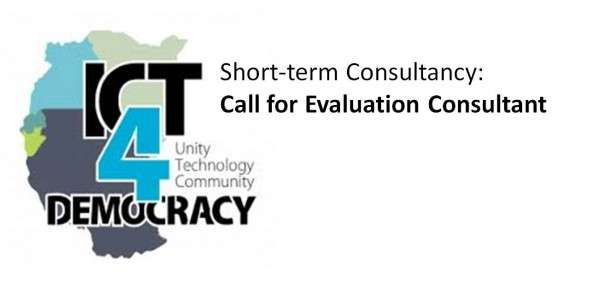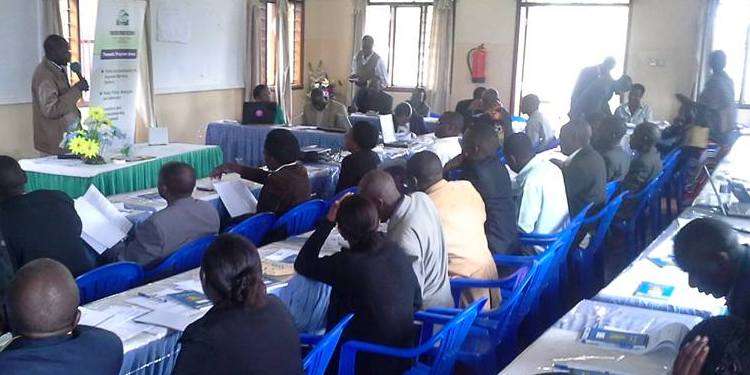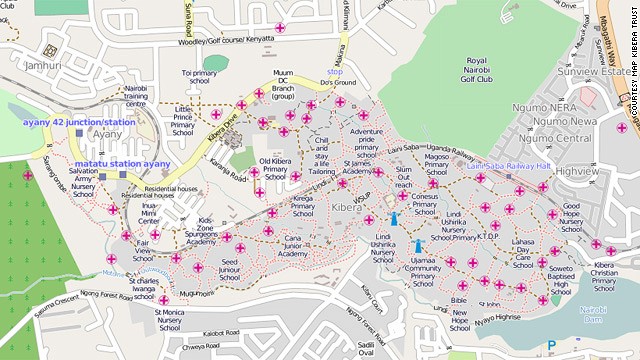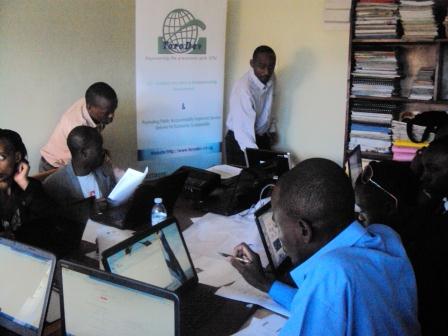The Collaboration on International ICT Policy in East and Southern Africa (CIPESA) is seeking an evaluation consultant to establish the achievements, outcome and challenges registered by the ICT4Democracy in East Africa Network during the period June 2016 to December 2018. The evaluation will assess the appropriateness, effectiveness and outcomes of the network in relation to the program objectives
Closing date for applications: 17:00 hours East African Time (EAT) on Friday December 7, 2018
Further details on the scope, eligibility and how to apply are available here.
Reflecting on ICT for Democratic Engagement in Uganda’s Rwenzori Region
By Ashnah Kalemera |
In the Rwenzori sub-region of western Uganda, Information and Communication Technology (ICT) tools have been key tools in promoting public accountability and improved service delivery. Through an ICT “convergence approach” that combines SMS, radio and online polling, Toro Development Network (ToroDev) has for the past five years promoted information and knowledge sharing for citizens’ engagement with their leaders on priority service delivery needs and concerns in the region.
ToroDev’s project, which is part of the ICT4Democracy in East Africa Network, has empowered local citizens in offline and online advocacy and engagement with duty bearers, trained radio journalists in reporting and promoting debate on accountability issues, facilitated quarterly accountability meetings between citizens and leaders, and supported the initiation of 15 civic groups in the region. The civic groups, also known as rural advocacy forums, consist of 80 members each, and are involved in citizen journalism and community mobilisation for the radio debates and accountability meetings.
Over the years, the project has seen increased levels of citizen participation and engagement. In 2014, each monthly advocacy forum meeting was attended by at least 50 members. Outcomes from the monthly meetings are discussed on radio talk shows. Meanwhile, 60 leaders at sub-county and parliamentary level participated in the deliberations and jointly with citizens drew up action plans, among them, the State Minister for Finance.
In western Uganda’s Rwenzori region, citizens’ participation on radio talk shows on governance issues through SMS, call ins, and social media grew from 304 in June 2014 to 4,835 by Nov 2014. See ICT4Democracy in East Africa Annual Review 2014.
Citizens have also gone on to leverage social media to engage in discussions on governance and service delivery. See for instance State of Service Delivery in Rwenzori Region, Orukurato, Rwenzori Journalists Forum and Listeners’ Forum Facebook with active membership pages.
However, at a national level participation of citizen in public affairs remains low. During the 2011 presidential elections, only 59% of registered voters cast their ballot. According to the 2013 Uganda National Household Survey, only 7% of households have a member that participates in governance at the local level, down from 10% in 2010.
The 2013 survey estimates that household participation in local governance in Western Uganda stands at 8.1% and the region boasts the highest proportion of citizens registered as voters (89%).
In the run up to the 2016 national elections, ToroDev convened regional stakeholders at a conference to reflect on the role of ICT in the electioneering processes. Uganda will hold local, parliamentary, and presidential elections in February 2016.
Speaking at the conference, Dr. Paschal Kabura, the director of Uganda Martyrs University Fort Portal campus, urged local citizens to take interest in staying informed of regional concerns that directly affect their livelihoods. “Voter apathy must be overcome,” he said, while calling for more active citizen participation in local governance processes through the use of ICT.
Discussions at the conference also included mainstreaming gender in governance processes. Goretti Amuriat from the Women of Uganda Network (WOUGNET) highlighted the need for building women’s capacity to participate in advocacy and accountability engagements, and for promoting awareness of gender issues at community level. She also stressed the need to consider women’s special needs such as child care facilities at local government consultation meetings, and suitable timing and conducive locations of accountability forums for both women and men.
Amuriat urged workshop participants to fight “biased cultural attitudes” in the region such as only men being leaders, what a man says being “right and final” and women being undermined due to their domestic responsibilities. She said it was important for women to realise that such attitudes “are not biological but socially constructed.”
The conference provided a platform for feedback and knowledge sharing on the performance of existing rural advocacy forums and the potential for establishing forums consisting of local government officials and civil society organisations at district level.
“As a result of the work of advocacy forums we have seen water put in place for example in Mugusu and Katebwa sub-counties in Kabarole district, two class room blocks have been put in place in Bufunjo Seed school in Kyenjojo district, roads [have been] improved in Kichwamba, Rwebisengo and Ntoroko District,” said Tumwesigye Andrew, the leader of Bufunjo Forum in Kyenjojo District, during the panel discussion on the performance of advocacy forums. “We have improved staff in health centres in Bufunjo, improved accountability and improved participation of women in budgetary processes and meetings,” he added.
The conference, which was held on November 19, and 20, 2015 drew more than 80 stakeholders from the districts of Kabarole, Kyegegwa, Kyenjojo, Kasese, Kamwenge, Bundibugyo and Ntoroko. They included district planners, radio, print and TV journalists, civil society organisations, religious leaders, advocacy forum members, youth leaders, district information officers and other local government officials.
The ICT4Democracy in East Africa Network is a regional coalition of civil society organisations leveraging ICT to promote civic participation, human rights and democracy in Kenya, Uganda and Tanzania. Coordinated by the Collaboration on International ICT Policy for East and Southern Africa (CIPESA), it was established in 2011 with seed funding from the Swedish Programme for ICT in Developing Regions (Spider) and is currently supported by the Swedish International Development Cooperation Agency (Sida).
We are watching you! Tech helps Africans hold governments to account
By Loren Treisman
(CNN) — With hundreds of millions of Africans owning mobile phones, citizens are becoming increasingly well connected. This is providing a powerful opportunity for citizens to access critical information about their parliaments and to report on human rights violations, corruption and poor service delivery.
These interventions are amplifying the voices of marginalized communities and helping citizens to hold governments to account.
For citizens to actively participate in democracy, it is critical that they are able to access information on parliamentary proceedings and elected representatives. MySociety is contributing to this process. It has partnered with local organizations across Africa to build sites like Mzalendo in Kenya and Odekro in Ghana, which enable citizens to access information about parliamentary proceedings and their elected representatives, rate their MPs and gain a better understanding about government’s inner workings.
They’ve taken this process one step further in South Africa. The Open Democracy Advice Centre has created a platform where citizens can submit Freedom of Information Requests. A data repository has been created online, enabling journalists, analysts and campaigners to utilize this information to hold government to account and campaign for improved service delivery.
There’s a real thirst for this information in Africa. In Nigeria, a simple application created by developer Pledge 51 enables citizens to access their constitution by mobile phone and has been downloaded more than 750,000 times. During protests sparked by last year’s fuel crisis, where an increase in the price of fuel resulted in soaring commodity prices, this enabled citizens to exercise their rights against police forces.
Misinformation fueled this crisis, with few citizens understanding the new fuel subsidy payment or oil revenue share in their country. A local organization called BudgIT aimed to address this by generating simple infographics which took citizens through these complex processes in a visual format.
Utilizing the power of social media, this sparked more informed debates and dialogue that contributed to restoring order. The team has since produced a whole series of images that breakdown the Nigerian budget by state and sector, enabling citizens to better understand the country’s budget and to utilize this information to ensure that allocated funds are translated into improved services.
Across the continent, platforms are being developed that enable citizens to use SMS from basic phones to report challenges in service delivery. In the impoverished Khayelitsha township in Cape Town, residents have submitted around 3,000 reports on issues like poor sanitation, electricity and transport to the Lungisa platform from their mobile phones, Facebook and the web. Remarkably, most of the issues have been resolved by the city council.
In Northern Uganda, the brutal Lord’s Resistance Army conflict has displaced hundreds of thousands of people, leaving infrastructure and service delivery in dire straits. A Peace, Recovery and Development Plan has been put in place but progress is limited. Only a few health centers have been established, there’s a severe shortage of drugs, medical workers and equipment and corruption is commonplace.
CIPESA has created a platform populated with information on health programs being implemented in the region and citizen journalists are able to submit reports, photographs and audio footage describing the real situation on the ground, whilst Voluntary Sector Accountability Committees established by WOUGNET are utilizing a similar platform to report on corrupt practices and poor governance. The data collected is being used by the NGOs to hold government to account and advocate for improved services.
In many African countries, youth often feel excluded from the political process. As young people are the biggest consumers of technology, platforms are being developed that enable them to become more actively engaged. In Kenya, Youth Agenda is utilizing an SMS platform to encourage youth to vet their leaders according to policies and attributes instead of along tribal lines. The platform is also used to gauge political opinion. The feedback is collated into reports which are fed into government, giving youth a voice and allowing them to contribute to the development of policy.
Until 2009, Kibera — one of the world’s largest slums and home to more than 250,000 people — appeared only as a blank on online maps. This made it easy for government to ignore the needs of its citizens. Map Kibera has equipped young activists with GPS-enabled phones and has supported them in creating a map of the region, part of a wider program that empowers youth to raise awareness of the challenges faced by their communities and advocate for change.
Plan Cameroon has taken this process a step further in three districts. Once youth have mapped their area, they populate the map with data on service delivery such as access to water points, clean water and hygiene facilities. Local councilors and activists are utilizing this data to mobilize the involved communities to demand better services and advocate for change.
Homegrown solutions are often most effective, as local communities are best able to understand the complex local needs, behaviors and nuances. Some of these hubs such as Jozi Hub in Johannesburg and Co-Creation Hub in Lagos, Nigeria, have targeted programs to support transparency initiatives, thus catalyzing this process.
Undoubtedly, technology isn’t a panacea for all social problems. And at times, such as when the technology utilized isn’t locally available or where governments lack capacity to respond to issues being reported it can be entirely inappropriate. However, when combined with well devised programs, their power to reach the previously unreachable and to bring the voices of citizens closer to government makes them a significant contributor to the process of ensuring that government’s best serve the interests of their citizens.
This article was published by CNN on August 12, 2013
GISWatch 2012 Reports Published
The 2012 Global Information Society Watch (GISWatch) reports have been published. GISWatch is a collaborative community committed to building an open, inclusive and sustainable information society, through collaborative monitoring of implementation of international (and national) commitments made by governments towards the creation of an inclusive information society.
It focuses on monitoring progress made towards implementing the World Summit on the Information Society (WSIS) action agenda and other international and national commitments related to information and communications. It also provides analytical overviews of institutions involved in implementation. GISWatch aims to make governments and international organisations accountable for meeting the commitments they make through contributing to building a strong and sustainable global civil society policy advocacy network.
The GISWatch Reports are a series of yearly reports covering the state of the information society from the perspectives of civil society.
GISWatch is not only a publication, it is a process. The long term goal of the project is to build policy analysis skills and ‘habits’ into the work of civil society organisations that work in the areas of ICT for development, democracy and social justice.
ICT4Democracy in East Africa network partners CIPESA and WOUGNET are contributors to the 2012 edition.
Download the reports here.
This article was published by the ICT4Democracy in East Africa Network on February 18, 2013.
ToroDev trains rural youth and women in online advocacy for improved service delivery
 ToroDev has started training rural women and youth leaders in the seven districts of the Rwenzori Region in using online tools to monitor service delivery. The maiden residential 2 days training involving ten participants was held on 16th – 17th of August, 2012 at ToroDev resource center in Fort Portal, Uganda. The training which is supported by ToroDev in partnership with SPIDER/Stockholm University was facilitated by Milton Aineruhanga from WOUGNET.
ToroDev has started training rural women and youth leaders in the seven districts of the Rwenzori Region in using online tools to monitor service delivery. The maiden residential 2 days training involving ten participants was held on 16th – 17th of August, 2012 at ToroDev resource center in Fort Portal, Uganda. The training which is supported by ToroDev in partnership with SPIDER/Stockholm University was facilitated by Milton Aineruhanga from WOUGNET.
ToroDev will train 210 rural monitors and advocates in online/ Web 2.0 tools to collect, document and disseminate online public accountability for improved serviced delivery issues. They will particularly oriented on how to interact with the “Ushahidi” online platform and other relevant open-source software. The monitors were also trained in online social media tools, human rights, governance and democratic engagement.
The monitors were highly trained to be independent local citizens that will keep updating the community and project team at ToroDev about the status of service delivery and identifying communities own service delivery needs.
They will further go ahead to mobilize and encourage regular meetings and focus group discussions (FGDs) among the 14 Advocacy Forums in the region on issues of service delivery monitoring.
Rural Monitors will also advocate for quality and timely public accountability from local leaders. They will use 11 radio stations in the Rwenzori region as a major tool for distributing/disseminating all the information accessed through online/internet and mobile phones.
This information will be converged on the FM radio stations as a way of sharing information with the rest of grass root citizens in the region, who may not necessarily have the skills and afford town or access internet based knowledge tools. The rural FM radio will be used a hub for the convergence of all ICT tools for effective service delivery monitoring in the Rwenzori Region.
Some of the sample articles posted by the rural monitors on the Ushahidi platform.
http://wougnet.org/ushahidi/reports/view/59
http://wougnet.org/ushahidi/reports/view/66
http://wougnet.org/ushahidi/reports/view/62
http://wougnet.org/ushahidi/reports/view/64
http://wougnet.org/ushahidi/reports/view/56
http://wougnet.org/ushahidi/reports/view/51
Documented by Solomon Akugizibwe
This article was published on August 28, 2012, about the ICT4Democracy in East Africa project, which brings together various partners in the region – among them CIPESA.
For more information, visit www.ict4democracy.org




